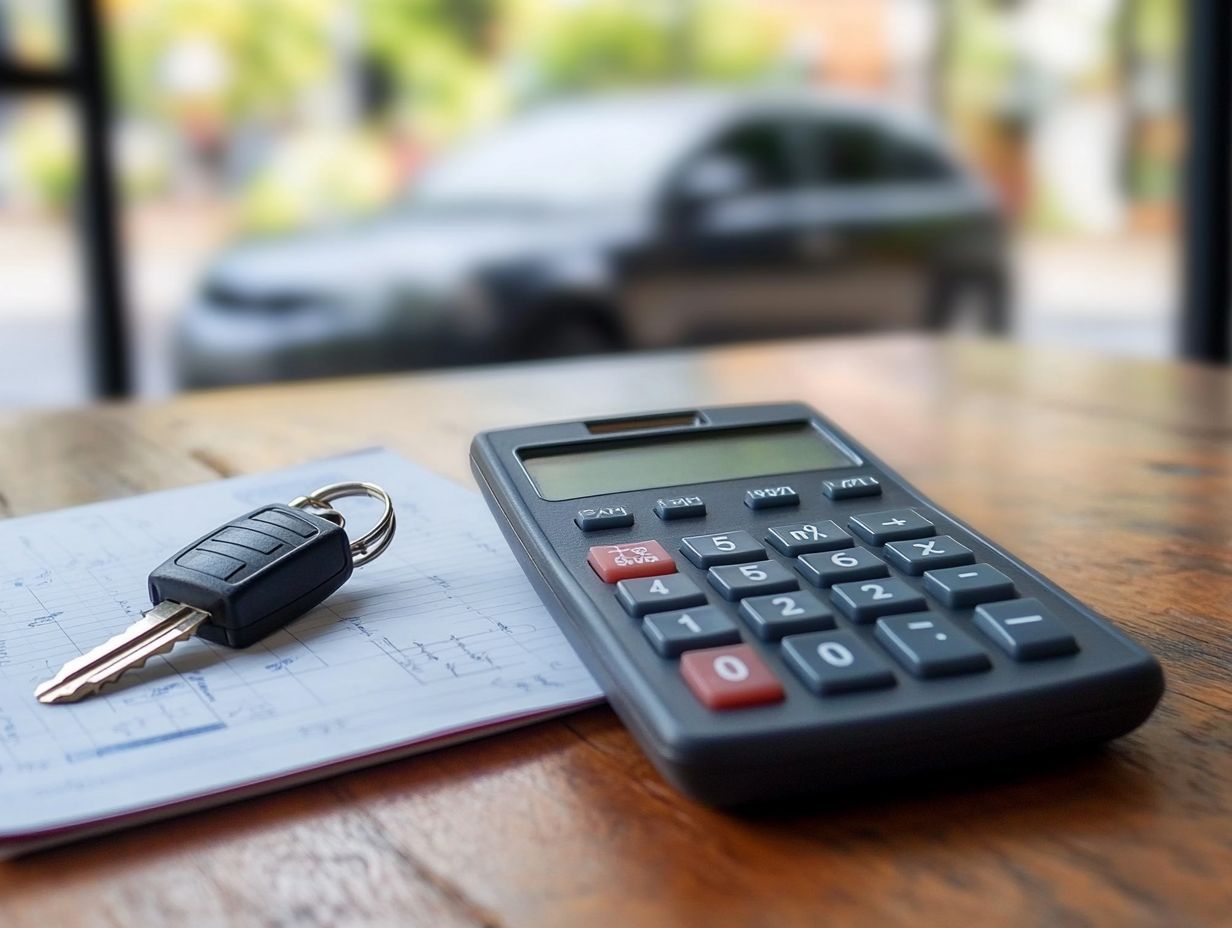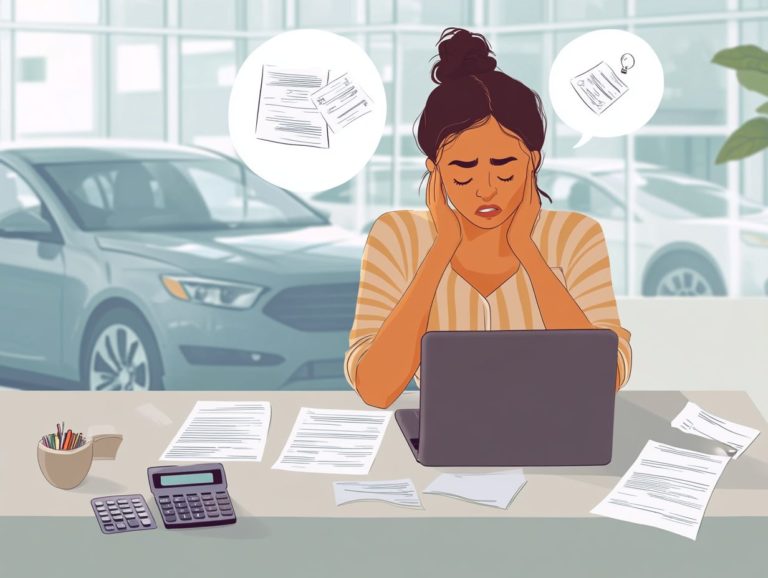Exploring the Impact of Interest Rates on Car Loans
When you re financing a new vehicle, interest rates are pivotal in shaping the total cost of your car loan.
Having a firm grasp of how these rates function and what factors influence them can greatly enhance your purchasing power.
This guide will walk you through the nuances of car loan interest rates, covering everything from their definition and significance to strategies for securing the best deals.
With this knowledge, you’ll be ready for your upcoming car-buying journey.
Contents
- Key Takeaways:
- Understanding Interest Rates on Car Loans
- Factors that Affect Interest Rates
- Types of Interest Rates for Car Loans
- The Impact of Interest Rates on Monthly Payments
- How to Secure the Best Interest Rate
- The Relationship Between Interest Rates and Car Sales
- Frequently Asked Questions
- How do interest rates affect car loan payments?
- Do interest rates play a role in determining the total cost of a car loan?
- What is the typical interest rate for a car loan?
- How can I get a lower interest rate on a car loan?
- What happens if interest rates change after I take out a car loan?
- How do interest rates impact the affordability of a car loan?
Key Takeaways:

- The interest rate on a car loan is a crucial factor in determining the overall cost of a vehicle, as it directly impacts monthly payments and total interest paid.
- Market conditions and your credit score are the main factors that influence interest rates on car loans, with a higher credit score often resulting in a lower rate.
- Understanding the difference between fixed and variable interest rates is important when choosing a car loan, as they can significantly impact the total cost of the loan over time.
Understanding Interest Rates on Car Loans
Understanding interest rates on car loans is essential for any car buyer aiming to navigate the auto loan landscape with confidence. These interest rates impact new car loans directly, influencing your monthly payments and the total cost of the loan.
The types of deals available in the Virginia market can also be influenced by these rates. With economic conditions continuously evolving and the Federal Reserve adjusting rates in response to inflation and various economic indicators, being well-informed can help you secure the best deals.
Whether you’re considering fixed or variable rates, grasping how these factors interact is vital for crafting effective financial strategies tailored to your vehicle financing needs.
Definition and Importance
Interest rates represent the cost of borrowing money for an auto loan, expressed as a percentage of the total loan amount. They are crucial for you as a car buyer in determining your loan terms.
These rates are shaped by various factors, such as your credit score, the length of the loan, and the current economic climate. Lenders typically calculate these rates to reflect both risk and reward.
Understanding these figures is not just about securing an affordable loan; it s also about effective budgeting over time. Higher rates can lead to significantly increased monthly payments and a higher overall cost for the vehicle.
Grasping this financial element enables you to make informed decisions that align with your long-term financial goals, ensuring that your vehicle purchase integrates seamlessly into your overall financial strategy.
Factors that Affect Interest Rates
Several key factors influence the interest rates on auto loans you encounter. Economic conditions, the Federal Reserve’s money management, your individual credit score, and the impact of inflation all play crucial roles in shaping these rates.
Understanding this landscape helps you as a car buyer to make informed financial decisions.
Market Conditions and Credit Score
Market conditions, including the supply and demand for vehicles and prevailing loan rates, along with your credit score, significantly shape the terms and interest rates of your auto loan.
When demand for vehicles spikes perhaps due to exciting new model releases or favorable economic trends lenders often raise interest rates to maintain balance in the market. Conversely, in a buyer’s market where supply outstrips demand, you may see rates drop, opening the door for you to take advantage of enticing financing options.
Your credit score plays a pivotal role in this dynamic. For instance, if you boast an excellent credit score, you’re likely to secure lower interest rates, even when the market is experiencing high rates. This relationship underscores the importance of maintaining a strong credit profile, ensuring you have access to the best financing options, no matter how the market fluctuates.
In conclusion, understanding these elements can empower you to make smart choices when financing your vehicle. Explore your options and consult with financial experts to find the best rates available!
Types of Interest Rates for Car Loans

When you re considering an auto loan, understanding the difference between fixed and variable interest rates is important. Each option has its own advantages and drawbacks.
Fixed vs. Variable Rates
Fixed interest rates provide stable monthly payments for the loan’s duration. In contrast, variable rates fluctuate with market conditions, which can change your loan terms.
This stability is great if you prefer predictable budgeting. However, variable rates may attract you with potentially lower starting points.
Keep in mind that they carry the risk of rising payments if interest rates increase. When choosing, consider current market trends and your financial situation.
If you have a steady income and a strong credit score, fixed rates might offer peace of mind. But if you can be flexible, variable rates could help you take advantage of falling rates.
The Impact of Interest Rates on Monthly Payments
Interest rates have a big impact on your monthly payments for auto loans. They determine how much you ll pay each month and affect the total cost over time.
Being aware of these factors helps you make better financial decisions when exploring your auto loan options.
Calculating and Comparing Costs
Calculating and comparing costs of different interest rates on auto loans is vital for car buyers. This analysis helps you secure the best loan offers.
Understanding loan agreements and researching options can lower your total expenses. Use online calculators to visualize long-term costs based on varying interest rates.
Pay attention to factors like credit scores and down payments, as they shape your loan conditions. Comparing multiple lenders ensures you find a loan that fits your financial situation.
How to Secure the Best Interest Rate
To get the best interest rate for your auto loan, you need strategic financial planning and good negotiation skills. A clear understanding of refinancing options is also key.
Tips for Negotiating and Refinancing

To negotiate and refinance effectively, learn about current market conditions and your credit score. Knowing the potential savings from better rates can boost your bargaining power.
Compare various lenders since rates vary significantly. A higher credit score can lead to lower rates, so check your score before starting the loan process.
Timing is crucial applying when rates are low can save you money. Consider the benefits of refinancing for lower payments or better terms if rates have dropped since your initial loan.
The Relationship Between Interest Rates and Car Sales
The link between interest rates and car sales is significant. Changing rates can either boost or slow down sales, depending on the economy and dealership promotions.
Understanding this can help you navigate your purchasing options more effectively.
How Interest Rates Affect Car Buying Trends
Curious about how interest rates affect your car buying journey? Let’s dive in! Interest rates significantly influence car buying trends. Higher rates generally lead to a drop in sales, while lower rates can invigorate demand for new and used vehicles across various economic climates. Additionally, understanding the impact of down payments on car financing can further enhance your purchasing strategy.
These fluctuations directly impact the amount you can spend and your willingness to finance larger amounts. When interest rates rise, the cost of borrowing increases, making even mid-range vehicles seem less attainable. You might find yourself gravitating toward more affordable models or even postponing your purchase.
When interest rates are lower, financing options look more attractive. This dynamic also affects dealerships, as they may revise their vehicle pricing strategies and promotional offers in response to market changes. Ultimately, this shapes your car buying behavior.
Frequently Asked Questions
How do interest rates affect car loan payments?
Interest rates directly impact car loan payments as they determine the cost of borrowing money. For those looking to understand how different rates affect payments, it’s important to know what to know about car loan rates and prices. A higher interest rate means a higher monthly payment, while a lower interest rate results in a lower monthly payment.
Do interest rates play a role in determining the total cost of a car loan?

Yes, interest rates significantly impact the total cost of a car loan. A higher interest rate results in paying more interest over the loan’s life, increasing the overall cost.
What is the typical interest rate for a car loan?
The average interest rate for a car loan varies based on factors like credit score, loan term, and the type of vehicle being financed. Typically, interest rates range from 3% to 10%.
How can I get a lower interest rate on a car loan?
To secure a lower interest rate on a car loan, consider improving your credit score, opting for a shorter loan term, and making a larger down payment. Shopping around and comparing offers from different lenders can also help you find better rates.
What happens if interest rates change after I take out a car loan?
If interest rates decrease after taking out a car loan, you may be able to refinance your loan to lower your monthly payments. Conversely, if rates increase, your monthly payments will also rise.
How do interest rates impact the affordability of a car loan?
Interest rates directly affect the affordability of a car loan. Higher interest rates can make a car loan less affordable due to increased monthly payments and a higher total cost. In contrast, lower interest rates make car loans more affordable.
Ready to find the best car loan? Start comparing rates now!






